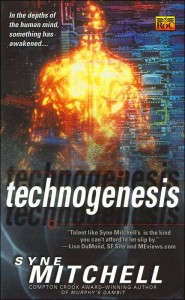 Syne Mitchell’s second book takes us to the near future, where society has evolved and rarefied until everything that matters takes place on the Net. People are almost permanently connected by various technological means, rendering privacy obsolete. They’re constantly bombarded by information, advertisements, messages and entertainment. So what happens when someone is cut off from that society? That’s the question answered by expert data miner Jasmine Reese. When her equipment fails, she’s unexpectedly left stranded in a world that no longer welcomes the disconnected. Then she receives an ominous message, regarding something known as “The Beast.” Now she’s caught up in a bizarre conspiracy, sent to investigate the potential existence of a dangerous Artificial Intelligence, manipulated into infiltrating a dangerous organization. What she does could change the world… or destroy civilization. But does she have the right, or the knowledge, to make the choice? Intriguing and surprising, Technogenesis is another pleasing offering from a relatively new author.
Syne Mitchell’s second book takes us to the near future, where society has evolved and rarefied until everything that matters takes place on the Net. People are almost permanently connected by various technological means, rendering privacy obsolete. They’re constantly bombarded by information, advertisements, messages and entertainment. So what happens when someone is cut off from that society? That’s the question answered by expert data miner Jasmine Reese. When her equipment fails, she’s unexpectedly left stranded in a world that no longer welcomes the disconnected. Then she receives an ominous message, regarding something known as “The Beast.” Now she’s caught up in a bizarre conspiracy, sent to investigate the potential existence of a dangerous Artificial Intelligence, manipulated into infiltrating a dangerous organization. What she does could change the world… or destroy civilization. But does she have the right, or the knowledge, to make the choice? Intriguing and surprising, Technogenesis is another pleasing offering from a relatively new author.
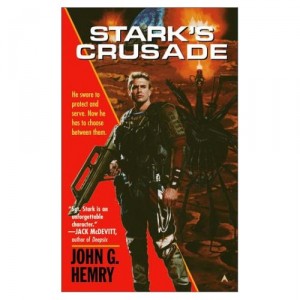 John Hemry concludes his exciting trilogy about Sergeant Ethan Stark, a man betrayed by his superiors and forced to go against the very system he stands for in order to do what’s right. He and the rest of the American forces on the Moon have successfully revolted against the military hierarchy and declared independence. Now they, and the civilians of the lunar colony, must work together or be destroyed by the numerous forces that want them back in line. Can the civilians and the military trust each other long enough to fight a war against the world that spawned them? Or will one side crack? If they can only last long enough, maybe Stark will save his people from the inevitable retribution, and make a change in the system.
John Hemry concludes his exciting trilogy about Sergeant Ethan Stark, a man betrayed by his superiors and forced to go against the very system he stands for in order to do what’s right. He and the rest of the American forces on the Moon have successfully revolted against the military hierarchy and declared independence. Now they, and the civilians of the lunar colony, must work together or be destroyed by the numerous forces that want them back in line. Can the civilians and the military trust each other long enough to fight a war against the world that spawned them? Or will one side crack? If they can only last long enough, maybe Stark will save his people from the inevitable retribution, and make a change in the system.
Hemry has combined a keen sense of action with a fine look at the morality of following orders, and produced a groundbreaking story in the same vein as The Forever War or Starship Troopers. This is military science fiction as I’ve come to enjoy it, and I look forward to more from this author.
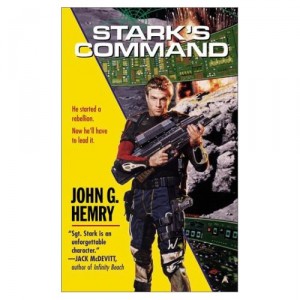 There’s the old saying, “If you want to do something right, you have to do it yourself.” There’s also the one about “putting your money where your mouth is.” Both of these sayings have just become quite relevant for Sergeant Ethan Stark, late of the United States military in the not so distant future. In the debut novel by John Hemry, Stark’s War, we watched as criminal stupidity, ineptitude, and negligence nearly annihilated a good part of the US military in a misguided attempt to seize the Moon’s resources for American interests. The end result of this ill-advised, disastrous campaign was a full-scale mutiny of the troops against their leaders, with Ethan Stark, the catalyst, being elected as leader pro tem of the newly independent forces. And as we start Stark’s Command, we find our erstwhile hero struggling with the new and unwanted responsibilities. There’s enemy forces to deal with, a civilian population on the Moon to negotiate with, and the inevitable retaliation from the American military. If one side doesn’t shoot him, the other’ll court martial and –then- shoot him. What’s an honest soldier to do?
There’s the old saying, “If you want to do something right, you have to do it yourself.” There’s also the one about “putting your money where your mouth is.” Both of these sayings have just become quite relevant for Sergeant Ethan Stark, late of the United States military in the not so distant future. In the debut novel by John Hemry, Stark’s War, we watched as criminal stupidity, ineptitude, and negligence nearly annihilated a good part of the US military in a misguided attempt to seize the Moon’s resources for American interests. The end result of this ill-advised, disastrous campaign was a full-scale mutiny of the troops against their leaders, with Ethan Stark, the catalyst, being elected as leader pro tem of the newly independent forces. And as we start Stark’s Command, we find our erstwhile hero struggling with the new and unwanted responsibilities. There’s enemy forces to deal with, a civilian population on the Moon to negotiate with, and the inevitable retaliation from the American military. If one side doesn’t shoot him, the other’ll court martial and –then- shoot him. What’s an honest soldier to do?
Luckily, the soldier in question is Stark, and he’s more than capable of holding his own against all comers, even when they strike at those closest to him, and the attacks take on a myriad of forms. He has to secure his authority before his people can be torn apart, without repeating the same mistakes that lead to the insurrection in the first place. He has to cope with watching people continue to fight and die for no good reason, and to make an effective hierarchy out of low-ranking officers. It’s a challenge, but nothing he can’t handle, right? Well, if he can’t, things’ll be over before they’ve even started.
Once again, we’re treated to a fascinating, complex look at the military mindset. Hemry goes light on the science, and heavy on the characterization, combat, and military procedure as he delivers the second installment in this exciting fable about the near future. We may have reached the Moon, but we’re no more mature for it. Nationalism is strong, bureaucracy still a stumbling block, and we’re our own worst enemies. And if that’s not believable, what is?
Stark’s Command is a good book. Not quite as good as Stark’s War, but it also seems to suffer from “middle book syndrome.” It’s painfully obvious that this is “to be continued,” and in that regards, it ends on a frustrating cliffhanger. It can’t be read as a standalone very well, not with the questions left dangling. But as the middle book of a trilogy, it serves its purpose and tells a damn fine story. For those who like military SF, this book more than serves the purpose, clearly claiming Hemry’s place at the Round Table of military SF writers. I’ll be looking forward to see how he resolves the story, and what else he has up his sleeve.
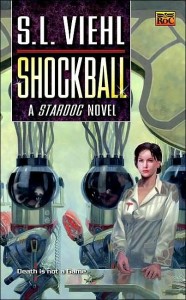 Dr Cherijo Grey Veil Torin has had an eventful couple of years, ever since she escaped her tyrannical, overbearing father, the famed surgeon Joseph Grey Veil, and fled Earth once and for all. In that time, she’s served as doctor to dozens of alien species, and dealt with things even her father would have been hard-pressed to handle. She’s experienced war, plague, and slavery, been adopted by an alien Clan, found and lost love, and journeyed into uncharted territories. But nothing at all has prepared her for the adventures ahead, as Shockball, the fourth book in the Stardoc series, takes her back to the one place she never wanted to see again: home.
Dr Cherijo Grey Veil Torin has had an eventful couple of years, ever since she escaped her tyrannical, overbearing father, the famed surgeon Joseph Grey Veil, and fled Earth once and for all. In that time, she’s served as doctor to dozens of alien species, and dealt with things even her father would have been hard-pressed to handle. She’s experienced war, plague, and slavery, been adopted by an alien Clan, found and lost love, and journeyed into uncharted territories. But nothing at all has prepared her for the adventures ahead, as Shockball, the fourth book in the Stardoc series, takes her back to the one place she never wanted to see again: home.
It was bad enough realizing the extent of Joseph Grey Veil’s diabolical manipulations and unethical genetic experimentation, which gave Cherijo her uncanny skills, her heightened abilities, and her enhanced healing factor. It was worse when she found out just what she truly was, and to what lengths Joseph would go in order to have her back. There was now war between the Galactic League and the alien Hsktskt, all because Joseph Grey Veil didn’t care who got hurt. But Cherijo and her new husband, Duncan Reever, were free at last from the Machiavellian mechinations of the good doctor, and on their way to new worlds. That is, until treachery and a surprise attack rip Cherijo and Duncan from safety, and deliver them back to Earth, and into Joseph’s clutches, for the next stage in a decades-old plan.
Rescued from Joseph’s fortress-like estate and given sanctuary among the Night Horse, a tribe of underground dwelling Najaho and alien-human hybrids, Cherijo and Duncan quickly discover the double-edged sword that makes the Night Horse just as dangerous as Joseph. Rico, their violent and unpredictable leader, forces Cherijo to become the tribe’s new healer, and Duncan to play as a member of the tribe’s “shockball” team, in a sport known for a high injury and mortality rate, but oh so popular nonetheless.
Now it’s up to Cherijo to play Rico off against Joseph, save the tribe from a mysterious and deadly disease, protect her husband from an untimely and nasty death, avoid the clutches of the Terran World government which wants her dead for her “father’s” sins, and still come out alive. In the process, she’ll discover her true purpose in existing, reveal long-hidden secrets about the family she’s never known, and utilize every inch of her capabilities. Because if she’s not quick or smart enough, Duncan will be the first of hundreds,
even thousands to die.
Shockball might be the fourth in the series, but it’s as open and accessible to new readers as any book really can be, catching everyone up to speed and laying out the complex and convoluted relationships without dropping into awkward expository or holding up the action. While it’s always nice to read a series in order, the casual reader won’t be lost if they start with this book. Dr. Cherijo Torin is capable, strong, and resourceful, but possesses enough vulnerability to make her victories the struggle they should be, and the stakes are personal enough that she can’t afford to lose, which makes her a thoroughly engaging protagonist and provides a compelling point of view. While the villains of the piece, Rico and Joseph, may strut around twisting their moustaches and declaiming their fiendish plans to a helpless heroine, rest assured that more lies beneath the surface, and closer examination makes everything fall into place by the end.
S.L. Viehl has once again delivered a fast-paced story with enough twists and turns to turn it into a roller coaster; once it hits that certain point, there’s no stopping the action. And while the main characters might survive to the next book, no one’s survival is written in stone, as she capably demonstrates throughout the series. Hopefully, the fifth book in the Stardoc series will clear up some of the lingering questions that have been raised and entertained, but overall, the gradual revelations have been perfectly placed along the way. Intelligent and sharp, this is a book worth checking out, especially for fans of James White’s Hospital Station series.
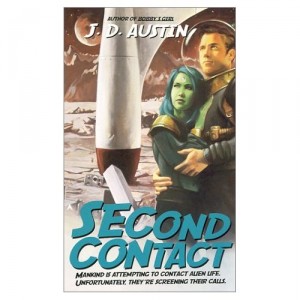 Welcome to the year 2039. Earth’s a nice place to be. A little more advanced, a little wiser, a little more civilized. Their first starship, the GSS Lifespring, is about to make a historic first contact with the distant planet, Kilvan. It’s a mission of peace, the open hand of friendship, and a chance to build a bridge of diplomatic relationships between the two races. For Kilvan is a lovely, peaceful planet, whose name means “tranquil” in a long-dead language. As far as anyone can tell, there’s no reason to expect anything other than a warm welcome. That’s why it comes as quite a surprise when Kilvan fires several missiles across the Lifespring’s bow and politely asks them to leave.
Welcome to the year 2039. Earth’s a nice place to be. A little more advanced, a little wiser, a little more civilized. Their first starship, the GSS Lifespring, is about to make a historic first contact with the distant planet, Kilvan. It’s a mission of peace, the open hand of friendship, and a chance to build a bridge of diplomatic relationships between the two races. For Kilvan is a lovely, peaceful planet, whose name means “tranquil” in a long-dead language. As far as anyone can tell, there’s no reason to expect anything other than a warm welcome. That’s why it comes as quite a surprise when Kilvan fires several missiles across the Lifespring’s bow and politely asks them to leave.
In true Earth style, our response is to leave for the moment. But, now that we’ve made contact with another race, a potentially hostile one, we can’t let the matter rest. It’s to that end that the USS Forlorn Hope and its brave crew are sent back to give peace a second chance … and if that fails, nuke Kilvan before they can come after us. But appearances aren’t what they seem. Kilvan’s a genuinely friendly world, a world of leisure, centuries ahead of us in technology but equally advanced in a pursuit of creature comforts. It’s not their fault they’re having a bad year, attitude-wise. It’s just something in the atmosphere. The only problem is, the arrival of the Forlorn Hope is about to coincide with the worst day Kilvan’s had in three hundred years….
In Second Contact, J.D. Austin (a psudonym for Joshua Dann, better known for his popular Timeshare trilogy) takes all of the old “First Contact” cliches, stabs them in the back, and shoves them into a dark closet, and locks the door securely afterwards. This book, pointedly tongue-in-cheek, possesses a certain wry humor that pokes fun at all the grim and solemn conventions of making contact with alien races, delivering its observations through the eyes of humans and Kilvans alike in a manner calculated to coax a laugh from the reader when they least expect it. It’s not a serious book, but one rich in characterization and filled with a certain warmth, making it a pleasant, albeit quick, read. Kilvan comes off not so much as an alien environment as it does a world modeled after the best beach resorts and Parisien cafes, with advanced technology thrown in for good measure. So if you’re in the mood for an easy, somewhat amusing read to kill the afternoon or cleanse the palate between sprawling space operas and scientifically-accurate explorations of Mars, this is the book for you.
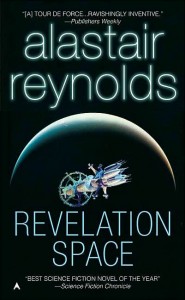 More than five hundred years from now, mankind has finally left Earth behind, recreating itself in a hundred different ways to deal with the rigors of space, the inhospitality of alien planets, the dissatisfaction with their original form. As immense starships called lighthuggers ply their trade between planets, traveling at the speed of light so that even a short journey might cover decades, as the colonists of Yellowstone continue to recover from the Melding Plague which joined flesh and machine with disastrous results, and as people enter the planetary oceans of the Pattern Jugglers to have the inconceivably alien micro-organisms rearrange their minds to achieve new levels of thinking, a billion-year old secret is about to be uncovered at long last. And we’ll finally know just why we’re all alone in the universe. Why our calculations, postulating the existence of other spacefaring races, have been wrong.
More than five hundred years from now, mankind has finally left Earth behind, recreating itself in a hundred different ways to deal with the rigors of space, the inhospitality of alien planets, the dissatisfaction with their original form. As immense starships called lighthuggers ply their trade between planets, traveling at the speed of light so that even a short journey might cover decades, as the colonists of Yellowstone continue to recover from the Melding Plague which joined flesh and machine with disastrous results, and as people enter the planetary oceans of the Pattern Jugglers to have the inconceivably alien micro-organisms rearrange their minds to achieve new levels of thinking, a billion-year old secret is about to be uncovered at long last. And we’ll finally know just why we’re all alone in the universe. Why our calculations, postulating the existence of other spacefaring races, have been wrong.
Revelation Space is a complex space opera, taking place on truly mindboggling levels, the narrative itself spanning decades, the overall story covering billions of years. While it starts off with the relatively small quest of archaeologist Dan Sylveste as he attempts to unravel the secrets of the Amaratin civilization, dead for over nine hundred thousand years, it soon expands to reveal a far greater complexity and scope. Sylveste’s quest takes on Ahab-like proportions as he pursues the answers to his questions at any expense. Joining him are mercenary-turned-assassin Ana Khouri, caught up in the enigmatic manipulations of a woman known only as The Mademoiselle, and Ilya Volyva, part of the cyborg crew of the lighthugger Nostalgia For Infinity. Their separate quests start decades and planets apart, and all come together over the planet Resurgam, once home of the avian-descended Amaratin. Battling betrayal from within and without, facing off against the Mademoiselle’s scheme to have Sylveste assassinated, the bizarre transformation afflicting the captain of the Nostalgia For Infinity, the malevolent and legendary Sun Stealer, these unlikely heroes will journey light-years to discover the awful truth behind the Amaratin annihilation, a truth just waiting to destroy us as well.
Planet-destroying weapons. Brain-altering micro-organisms. Murderous alien artifacts. Gigantic starships suffering from disuse and neglect. A billion-year-old war between the stars. Transformations on the micro and macro levels for humanity. Thinking absolutely nothing of traveling for decades to reach a destination. Aliens who truly think in ways we can’t begin to comprehend. These are just some of the trappings of this densely plotted, multi-layered novel, which more than lives up to the potential of the genre, and breathes new life into it to boot. While it may be hard to see how it all fits together in the beginning, the full picture lies revealed at the end, the threads woven together seamlessly. No easy read, but a book worth taking your time in reading, Revelation Space provokes thought, offering up a future where anything is possible, and our own imagination guides our potential. From bombs smaller than a speck of dust to planet-sized computers, it doesn’t pull its punches. And the closer it gets to the end, the more urgent the story becomes, the stakes as high as they can get on a personal level for the characters, and on a racial level for humanity as a whole.
This book comes with my highest recommendations. I was up late for several nights in a row, constantly looking for a good stopping point, constantly wanting “just a few more pages.” And if this is Alastair Reynold’s first novel, then the genre is in for a real treat with his next work. Don’t miss Revelation Space.
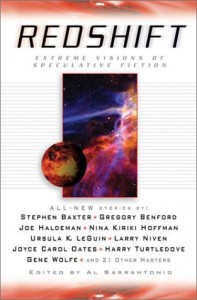 Inspired by Dangerous Visions, and driven by the same goal, to deliver “cutting edge” original science fiction, Redshift bills itself as “Extreme Visions of Speculative Fiction.” What happens when you mix numerous Hugo, Nebula, World Fantasy, Bram Stoker and Joseph Campell Award winning authors? You get an intensive, impressive volume, containing new stories by some of the very best in the field, as well as authors who have never been associated with science fiction before. Thus, Redshift sports original fiction by Gene Wolfe, Joe Haldeman, Gregory Benford, Nina Kiriki Hoffman, Larry Niven, Michael Moorcock, Ursula K. LeGuin, and Harry Turtledove, just to name a few of the big name genre authors. It also features the very first science fiction tale by Joyce Carol Oates, Rambo creator David Morrell, and previously unpublished author Laura Whitton.
Inspired by Dangerous Visions, and driven by the same goal, to deliver “cutting edge” original science fiction, Redshift bills itself as “Extreme Visions of Speculative Fiction.” What happens when you mix numerous Hugo, Nebula, World Fantasy, Bram Stoker and Joseph Campell Award winning authors? You get an intensive, impressive volume, containing new stories by some of the very best in the field, as well as authors who have never been associated with science fiction before. Thus, Redshift sports original fiction by Gene Wolfe, Joe Haldeman, Gregory Benford, Nina Kiriki Hoffman, Larry Niven, Michael Moorcock, Ursula K. LeGuin, and Harry Turtledove, just to name a few of the big name genre authors. It also features the very first science fiction tale by Joyce Carol Oates, Rambo creator David Morrell, and previously unpublished author Laura Whitton.
So what’s the verdict? It’s ambitious and challenging. The stories within are fully representative of the scope and range of the genre. Whether it’s the tale of a son dedicated to bring his father back from the brink of death, or Saturday Night at the Surrealist Sporting Club, or even the disturbing story of Billy the Fetus, bad before he was born, the contents of Redshift deliver new and interesting takes on the field. There’s something to appeal to everyone, and something bound to offend or disquiet everyone. For original science fiction that dares to push what few limits remain, Redshift is definitely worth checking out.
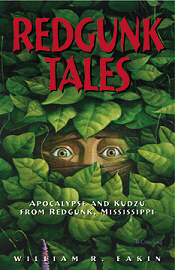 Redgunk Tales is subtitled “Apocalypse and Kudzu from Redgunk, Mississippi,” and that’s about as accurate a description of this unusual collection as any. Because where else are you going to find aliens, ghosts, swamp gas, a dime store mummy, a yellow dog with black smelly lips, and four hundred-odd (and I do mean odd!) people,
Redgunk Tales is subtitled “Apocalypse and Kudzu from Redgunk, Mississippi,” and that’s about as accurate a description of this unusual collection as any. Because where else are you going to find aliens, ghosts, swamp gas, a dime store mummy, a yellow dog with black smelly lips, and four hundred-odd (and I do mean odd!) people,
all in one place?
It’s like someone took your average Southern small town, doped up the inhabitants on pulped William Burroughs and Hunter S Thompson, spiced the result with essence of Weekly World News, and served what was left with a twist of gamma-irradiated lime. Thirteen stories, ten of which have appeared before in publications such as Realms of Fantasy, Science Fiction Age, and Amazing Stories, three of which are brand-new, pull back the curtains and expose the truly irrational and unusual nature of a small Mississippi town home to weirdness and the unexpected.
It’s impossible to read these stories all in one sitting. One at a time, with a day or two to recover in between assaults upon your rational side, that’s the way to take it. Savor them, mull them over, reflect upon the ghost of the last living Druid, condemned to forever mow a certain patch of land. Contemplate the woman who discovers that the perfect man for her is utterly and absolutely alien, and can be kept in a jar. Ponder a dragon conjured out of the subconscious and into the sewers. Meditate upon Orange Decker, abducted by aliens. Ask yourself what the Secret of the Mummy’s Brain is.
Describing the contents of Redgunk Tales is like trying to smell music. Some things can only be experienced, and that’s the case with William Eakin’s particular and peculiar prose, some of which is so lyrical and whimsical as to transcend the normal mode of storytelling. I’d love to hear these stories read out loud, as I suspect they’d adapt themselves to an oral format better than most. While Redgunk Tales isn’t normally the sort of thing I’d gravitate towards, I can certainly recommend it for making me think outside the box.
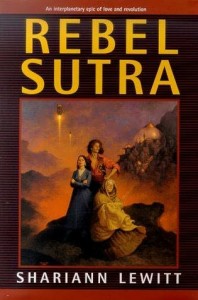 The world of Maya is, quite literally, an aristocracy. “Government by the best.” And on this planet, settled centuries ago by colonists whose ship malfunctioned on the way to somewhere much better, the “best” means being one of the Changed, a race of genetically-enhanced humans who rule with an iron fist inside a velvet glove. Their home is a work of art, Xanadu in name and form, situated high on the Mountain above the human-only ghettoes of Babelion. The Changed are stronger, faster, smarter, longer-lived, and so different as to be almost alien. To be Changed is to be vastly superior to mere humans, and it’s in that discrepancy that bitterness, resentment, and the smoldering embers of rebellion are harbored.
The world of Maya is, quite literally, an aristocracy. “Government by the best.” And on this planet, settled centuries ago by colonists whose ship malfunctioned on the way to somewhere much better, the “best” means being one of the Changed, a race of genetically-enhanced humans who rule with an iron fist inside a velvet glove. Their home is a work of art, Xanadu in name and form, situated high on the Mountain above the human-only ghettoes of Babelion. The Changed are stronger, faster, smarter, longer-lived, and so different as to be almost alien. To be Changed is to be vastly superior to mere humans, and it’s in that discrepancy that bitterness, resentment, and the smoldering embers of rebellion are harbored.
Every year, a select group of promising humans are brought up the Mountain to be tested, to see if they will be deemed worthy of serving alongside the Changed. There are jobs to be done, far better than the menial and poorly-paying jobs that await most people. It’s a farce, a sop to keep the humans from realizing that they have no chance of ever being good enough. No humans are ever good enough, for the testing requires them to mesh with the Exchange, the supercomputer that runs the colony and requires brainpower to continue working. Only the Changed are sophisticated and experienced enough for this complex test.
With the caste system securely in place, and the simmering resentment between humans and Changed at an all-time high, the time is ripe for change. One year, a human with a gift of oration and a knack for political upheaval meets a Changed woman with that same sense of vision and willingness to defy the status quo. Their time together plants the seeds for the destruction of all the Changed hold dear. For in their future lies death, betrayal, manipulation, loss, revolution, war on a grand scale, and revelations. It’s a multi-layered, Byzantine series of machinations that spread over generations, and will culminate in flames and the repudiation of a centuries-old system.
In Rebel Sutra, author Shariann Lewitt creates a fascinating and imaginative story, space opera with romantic trappings and political complexity, made all the more interesting by drawing from Hindu mythology and Indian culture to flesh out the conflicting castes of the Changed and the humans. What starts off as a love story soon blossoms into something far grander, taking revolution to the Mountain, and to the stars. Secrets unfold as the stories are told, using the voices of the main characters to unveil the different aspects. Arsen, a human driven to rebellion. Della, the Changed woman who’s so much more than she knows, whose love for Arsen changes everything. Anselm, their son, who inherits the best and worst qualities of both. Suu-Suu, one of the mysterious star-traveling Tinkers, whose actions a generation ago may just doom not just Maya, but an entire galactic empire.
This isn’t an easy read, but only because it’s such a complex and tightly-woven story, whose aspects are intricate enough to warrant rereading several times for enlightenment. It comes highly recommended for those who love space opera and harder science fiction, and those who want something just a little different from the norm.
Reissued after 15 years, *Privateers* still stands out as one of Hugo-winning Ben Bova’s many outstanding efforts. Although its Cold War mentality might seem a little outdated by today’s standards, the plot remains compelling and fresh, and the story is as attention-grabbing as ever.
In a future where mankind has finally taken its first steps off of Earth and onto space stations and the moon, 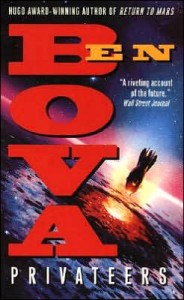 America has given up and thrown in the towel, leaving the way open for a smug Russia to finally take the lead in the space race. Worse yet, they dominate the markets, both on Earth and off, a tyrannical and selfish
America has given up and thrown in the towel, leaving the way open for a smug Russia to finally take the lead in the space race. Worse yet, they dominate the markets, both on Earth and off, a tyrannical and selfish
economic domination that leaves America in the dirt, and finally opens up the way for other nations to have the spotlight. The new powers that be include Japan, Venezuela, Zaire, India, Polynesia, and the Pan-Islamic countries, all of whom possess vital manufacturing concerns situated in orbit. They are the only powers standing between the Soviets and complete control of the world.
But there’s a wild card. Dan Randolph, maverick billionaire and owner of the most powerful independent company in space, allied with Venezuela, and expatriate American, has no interest in seeing the Soviet empire expand any further. He develops a daring plan to steal a passing asteroid, and mine its resources to undercut the enemy. But when his people are kidnapped and his asteroid stolen, it’s all-out war of a new kind. If he can’t win legitimately, then he’ll apply good old-fashioned American gall to the case, and steal the resources from the Russians, exploiting obscure loopholes and straight-forward audacity. And when his people are killed, he’ll refuse to back down. America may be too scared to do a thing, but Dan Randolph and his companions, including the strong-willed Lucita Hernandez and the fiercely loyal Nobuhiko Yamagata, will do whatever it takes to break the stranglehold of Vasily Malik and the Soviet powers.
Privateers starts off on a high note, throwing us right into the action, and only then going back to fill in the back story, weaving a complicated and treacherous tale of industry, space, daring, political backstabbing, and ill-fated love. Bova stands out for his ability to mix strong characterization and the finest in science fiction adventure. While it may seem hard to envision Russia in a position of supremacy now, in the
post Cold War era, it wasn’t nearly as far-fetched when this book originally came out in 1985. That jarring and even distracting aspect aside, this is a top-notch adventure from a top-notch author. Dan Randolph is both genius and two-fisted hero, a combination which would put Bill Gates to shame in a heartbeat.
